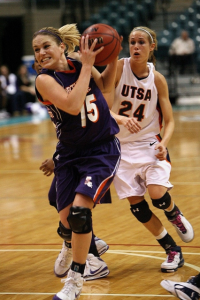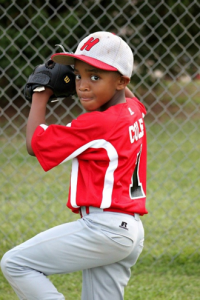About this series:
We have heard from a Physical Therapist about Sports Specialization and now we hear from Physician, Robyn Koeppen, MD about how physical activity can drastically improve the health of people of all ages—especially that of kids and adolescents. This article is part of a three-part series that examines healthy exercise in children and essential considerations for parents as they maneuver through early sports specialization. —Kathy Lawrence, Director of Health & Wellness
Early Sports Specialization: Can My Child Become A Pro Athlete?
 It’s a dilemma common to parents of young athletes. The child shows strong talent for a particular sport, an ability that seems to go beyond that of other young kids—or could, given the right training. The parent begins to wonder: Could my child play college sports—or even go pro?
It’s a dilemma common to parents of young athletes. The child shows strong talent for a particular sport, an ability that seems to go beyond that of other young kids—or could, given the right training. The parent begins to wonder: Could my child play college sports—or even go pro?
For some parents, the desire to help a child nurture an athletic talent can lead to early sports specialization, when other sports take a backseat to the one where the child excels. But there are drawbacks to specializing in a sport too early.
What should parents consider in determining whether their child should specialize in a sport? Here are four considerations:
 Age. A recent survey found that one-third of parents of pediatric orthopedic patients say their child plays a single sport. However, children who specialize in one sport before the age of 14 face increased risk of injury, another survey found. They were also more likely to experience multiple injuries in college. That’s why physicians recommend children wait to specialize in a sport until they are at least 14.
Age. A recent survey found that one-third of parents of pediatric orthopedic patients say their child plays a single sport. However, children who specialize in one sport before the age of 14 face increased risk of injury, another survey found. They were also more likely to experience multiple injuries in college. That’s why physicians recommend children wait to specialize in a sport until they are at least 14.
Risk of burnout. When kids focus on one sport nine months of the year from an early age, it’s hard for them to keep up the level of mental intensity needed to compete at a higher level. This is especially true when the goal of making a high school or college team is years away. Some kids end up not enjoying the sports they excel in and end up quitting sports entirely, despite their talent. Enabling kids to play more than one sport gives them a mental release from the “must play” sport while offering the chance to explore new ground.
 Muscle memory. Kids who play more than one sport are likely to have better “muscle memory,” or the ability to react physically with fluidity and ease. That’s because playing a variety of sports helps children strengthen muscles and ligaments by working with muscles that might not otherwise be exposed to conditioning. The result: a foundation of athleticism.
Muscle memory. Kids who play more than one sport are likely to have better “muscle memory,” or the ability to react physically with fluidity and ease. That’s because playing a variety of sports helps children strengthen muscles and ligaments by working with muscles that might not otherwise be exposed to conditioning. The result: a foundation of athleticism.
Longevity. An Ohio State study found children who specialize in sports before age 14 are more likely to quit their sport at a young age. They also are more prone to become inactive adults. Additionally, early sports specializers average a higher number of weeks missed due to injury (15.2) over the lifetime of their sport than those who do not specialize early (7 weeks).
Strengthening Success
While 54.7 percent of parents encourage their children to specialize in a single sport, early sports specialization can be a predictor of injury among boys and raises the risk of burnout for both genders. Encouraging children to participate in a variety of sports for as long as possible could instill a lifelong love of sports while strengthening their chances of playing sports into adulthood.

Robyn Koeppen, MD, is a family and sports medicine physician, Holston Medical Group, Huntersville and Denver, N.C.
The views, thoughts and opinions expressed by our writers
belong solely to them and do not represent
LKNConnect.com, its publisher or its staff.



